- Home
- Allison Brennan
Betrayed: Powerful Stories of Kick-Ass Crime Survivors Page 8
Betrayed: Powerful Stories of Kick-Ass Crime Survivors Read online
Page 8
“Clear the shit from your ears, GI Joe—I didn’t kill Alexander and I didn’t try,” he says as I feel the air temperature drop a bit. I throw on a few split logs. Fresh sweat pops like measles on Bailey’s face, forms rivulets, and drips onto the floor. “My work was sacred, not profane. If I’d wanted Alexander dead, I wouldn’t have used a two-inch blade. If you kill me in revenge, God will send you to Hell for murder.”
“About that, Bailey,” I say, setting the smokehouse thermostat at one-o-eight—high enough that he’d gasp and mewl like a tourist in the desert too long, but low enough to keep him alive for the main event. “Wanna know what The Big Guy says about you?”
“Oh ho! God talks to you, does He?” Bailey sneers. His flabby buttocks sizzle when rotating past the flames. I kick the logs back. I want him uncomfortable, not fried. “That’s a miracle for a heathen like yourself. Sure, go ahead, I can use a laugh.”
“He said you love two things above all: Hell and pointy objects,” I say. “Being that you’re a psychopathic degenerate, I can’t disagree, so it’s time for you to enjoy both to the max.” I breathe my hickory air, the purity of which Bailey is polluting. “This smokehouse, well, that’d be Hell, wouldn’t it? With lots of fire to make you moist and tender.”
“Moist and . . . oh, right. You’re going to cook me to death. Got it.”
“Not to death,” I say. “Just till you’re at the peak of spicy perfection. Then a friend and I will load you in a truck, drive you down to the swamps, and introduce you to the pointy object you were so fond of using on Alex.”
“A knife?” he says, misunderstanding. “Really? You’re going to all this trouble just to use a knife on me?” He laughs, still believing I’m bluffing and after a good hot scare I would turn him over to the cops, giving him the chance to plead some religious insanity nonsense and beat the rap. “I thought you ninja warriors were creative. But as I suspected all along, you’re just lummoxes with guns and bad tattoos—”
“A knife’s too kind for you, asshole,” I snarl, tired of his holier-than-thou smugness. “For the sin of murdering my wife, I’m going to feed you to the alligators.”
For the first time since I’d laid eyes on him, I see fear in his doughy face.
“Yeah, ‘gators. You’re a piker compared to those bad boys,” I say, watching fear turn into panic quicker than Jesus made cabernet from water. “You stabbed my wife three hundred times? Big deal. They’ll bite you a thousand. Slow, too, so you’ll feel every rip of flesh and bones. I’ll make sure of that because I’ll feed you to the gators feet-first. Each time you pass out from the agony—and you will—I’ll inject you with adrenaline and resume where we left off.”
“You can’t! You took an oath!” he sputters, eyeballs bouncing in fear and panic as he wet himself. He’s finally getting it. “You can’t murder innocent people!”
“You’re not innocent.”
“You . . . you . . . wouldn’t . . .”
“Yeah, I would. Say your prayers, Bailey. You’re going to need ‘em.” I shake my head, laughing. “Hell and alligators. That’s positively medieval.” I listen to his litany of pleas. “Hey, no whining, you brought this on yourself. If it’s of any comfort, I agree that you didn’t kill Alex. The cancer did. But you tortured her so badly she wished she’d died that day, and that’s unforgiveable. You mentioned murder? Nah. I’m not going to kill you, Bailey. The ‘gators are, with a thousand stabs from very short teeth. Each the same length as your knife blade—”
“No! Kill me now, Delaney,” he cries. “Please, I’m begging you. Not the alligators. You do it, Pig. Listen, I admit it, I murdered your wife. So you kill me. Eye for an eye.”
“More like a tooth for a—”
“No! Not the tooth! Forget this smokehouse and alligators! Just cut my throat and take your blood revenge. I don’t want to be eaten alive!”
“Neither did Alex. So you get what you gave her—Hell and pointy objects.”
Bailey hisses like embers, demons, and snakes. I stuff an apple into his mouth, then tie a gag over it. Not a pig roast. Pig’s roast.
“Bone appetite,” I say. “Pun intended.”
# # #
How to Not Find Somebody in Houston
By Liam Sweeny
Beyond the peeling Roman lettering that said Augustus Wilkins, Private Investigator, up the narrow staircase, and past the bullet-blessed door, Augie tipped his glass to the Bakelite radio as Willie Nelson’s “Devil in a Sleeping Bag” found its rightful place on KYRZ’s rotation. It was an understatement to call the song a B-side. Augie might not have known it had he not languished through many long, hot, sticky nights in Austin in the cab of his unmarked car with Willie’s entire repertoire blaring from a tiny Walkman speaker, back before the advent of earbuds.
It was hot. It was “H-town” hot, which meant the LCD display outside the Corazon International strip mall was using all three digits. Augie came in early-bird to a hundred and one—lord knew what it was in the middle of the afternoon rush.
“Hammy, wake up, my man.” Augie balled up a piece of paper and held it to the open mouth of his Wild Turkey, letting the bourbon soak in before he threw it at Hammy’s face.
“C’mon, Augie, five minutes,” Hammy said. “I’m chasin’ a good dream here.”
“If you don’t wake up, I’ll start talking about gross shit I saw when I was at Austin PD.”
“Just tell me your hot hooker stories.” Hammy folded his arms and curled into the couch.
“C’mon, Ham, seriously, get up.”
Hammy twisted to face the ceiling and rose like a two-bit Dracula from the old Penny Dreadful covers. He swung his legs to the floor and rubbed the sleep from his face with both hands. He groaned.
“What time is it?”
“Five-thirty…ish.”
“What the hell did you wake me up for? Nobody ever comes here during rush hour. Nobody goes anywhere in Houston during the rush unless they’re in it.”
“I know,” Augie said. “But I’m bored as hell. Part of your job is to amuse me.”
“But you don’t pay me.”
“And you don’t amuse me. It works out.”
Hammy got up, mimed a belly laugh, and walked to the window overlooking Bellaire Boulevard. He cracked the blinds above the rusty air conditioner.
“Hoo boy, a hundred thirteen.” Hammy lifted his shirt, capturing the cool air on his chest.
“Cut that out,” Augie said. “Whole damn place’ll be smelling like queso.”
Hammy sat back down. “So what’s on the plate, boss?”
Augie swiped his finger along the touchpad to wake up his laptop. He opened a project organizer/calendar he got from a grateful client.
“Let’s see…” Augie scrolled. “There’s two missing persons, Tom Phillips and June Landry. They’re both in the wind right now, but I’m guessing Landry is just squatting somewhere in the city.”
“We should be able to find her,” Hammy said. “If you think she’s in the city…”
“Big city, though. I’ve got feelers out with HPD. I also got a couple of suspicious wives, the Freeman and Lathan cases. Freeman’s hubby has a gambling problem, not a cheating problem, but I don’t have anything concrete to give the missus. Lathan, definitely a cheater, but again, no proof. Can’t get out at night right now. Everybody’s got their eyes out and their ears perked.”
The year before, the most shell-shocked city was New Orleans. But the second most shell-shocked city was Houston. The Astrodome overflowed with Louisiana evacuees, people who’d lost everything, with little hope and nowhere to turn. Not just the stadium, every run-down motel, SRO, slumlord disaster and homeless shelter filled up every section of the city too poor to pass the buck. It was just the beginning of an uncertain time.
Eventually, the dust settled; rather, the evacuees settled, in every corner of the contiguous forty-eight states had offers for resettlement. A lot of people got lucky. But a lot of people—the poor, unskilled p
eople without any prospects beyond tripling up on minimum wage jobs to feed their kids—didn’t. And now the city shuddered to absorb a whole new culture of poverty.
Augie was about to pour two shots into a pair of shot glasses with his name and logo on them when the buzzer rang. He was surprised he hadn’t heard anyone walk up the steps. Augie ran his fingers through his hair, picked at the frills on his leather jacket, and opened the door.
She was the reason guys became P.I.s in the first place. That femme fatale in a red slip dress, swimming in an oversized black sweater. Pearls and diamond earrings, bracelets on both arms, carrying a small black baguette bag. Not even a drop of sweat on her brow; Augie could smell the good AC still clinging to her from the car mixed with her couture perfume.
“Are you Augustus Wilkins?” she asked as she opened her bag.
“I am. Just call me Augie.” He motioned to the plush chair next to his desk. “Come. Sit.”
She smoothed out the back of her dress before sitting. Augie was amazed she didn’t seem to act as out of place as she looked. When a woman of class walked into Augustus Wilkins, Private Investigator, she might as well have been a soccer mom walking into the ladies’ room of a low-rent gas station. But she didn’t have the sheepish look; she had a polite smile.
Augie sat down and woke the laptop up. “What can I do for you today…”
“Marissa, Marissa Lunella.” She cleared her throat. “I need help finding someone,” she said. “His name is Marcus.” She slid over a picture of a young kid, dreadlocks, athletic build, a gold cap on his top left incisor, wearing Saints gear. A Louisiana kid, Augie wagered. He looked vaguely familiar, but in his line of work, faces were a dime a dozen. Maybe the kid was on the news one day. Maybe he was the kind of kid that made it to the news as far as Houston.
“Okay, hold on one second.” Augie leaned over to Hammy. “Can you entertain Marissa while I find a missing person form in the back room?”
“Sure, bud.” Hammy took Augie’s seat after he got up. He went into the back room and searched for forms. It seemed disorganized, but it served a purpose. Hammond Arsel had a unique talent—the gift of gab. When he got out there, she’d help him fill out the form, and maybe she’d be straight, and maybe she’d be leaving something out, but Hammy would leave their brief conversation knowing how much butter she likes on her toast. He was the Silly Putty you pressed on the Sunday paper.
Augie found the form and cleaned up a bit before rejoining Hammy and Marissa in the office. He thanked Hammy, who took it as his turn to sit in the back room.
“Okay, Marissa, I’m going to ask you a few questions, gives me a little background—something to jump off from. I made up this form based on my experiences, and knowing the questions I ask every time. It’s okay if you don’t know—just say so. And I’ll tell you that… sometimes people may leave things out, out of embarrassment, out of denial, maybe they forget. And I can work it either way. But it’ll just take longer, and cost more.”
Marissa nodded and pulled out a number ten envelope, stuffed—contorted—with cash, which she slid over to Augie.
“That’ll be to start,” she said. “I’ll answer what questions I can, but some things it’d be best for you to find out. I take it we can do this confidentially?”
“Of course,” Augie said. “As long as it’s legal.”
“It is,” she said.
Augie uncapped his pen. “Why don’t you just tell me what happened, and I’ll ask questions when I need to. Sound good?”
“Can I smoke in here?”
Augie poured a splash of bourbon in a shot glass and passed it to her. “Go ahead.”
She pulled out a pack of Marlboro Mediums and lit up.
“Marcus is from New Orleans. He was trapped last year when the levees breached. He made it to the Superdome, and they evacuated him. But we lost track of him, and they sent him to, well, here. By the time we realized where he was, they lost track of him over here, too. To be honest, I’m surprised they kept track of anybody.”
“Yeah, it was a mess. Still is.” Augie’s fingers slid over the form. “Now, you said his name is Marcus. Can I get his last name?”
“Keller. Marcus Keller.”
“First off, and I have to ask, did you file a missing person’s report with either of the states or the FBI?”
“I did, but each time they told me he’d probably never get found unless he just showed up. Between him being of age and caught up in the evacuation, they didn’t say it in so many words, but…”
“…take a number. I know the drill,” Augie said. “Do you know if Marcus has a driver’s license?”
“I think so?” she said. “I’m not sure.”
“So you wouldn’t know if he had a car.”
“No, he definitely didn’t. He never left the city except for school trips.”
Augie marked a few check boxes. “How old is he?”
“He just turned twenty-one.”
“Is he in college, or was he?”
She exhaled. “No. I know he finished trade school for welding.”
“Did he have a job before the storm?”
“Not that I know of.”
Augie massaged his writing hand. “Does he have any family or friends that you know of?”
“His mother, Dorothy, she died in Katrina.” She took a drag. “No family other than that. And I wouldn’t know about his friends.”
“Do you know where he lived before the storm?”
“He lived with his mother in the Lower Ninth Ward. He wouldn’t go back there; there’s no there, there. Whole neighborhood is just concrete slabs.”
“Damn,” Augie said. “Do you know if he has any medical issues?”
Marissa shifted in her seat, uncrossing and re-crossing her legs. “I’m not sure, not really.”
Augie asked a few more questions about hangouts, last knowns, aliases, tattoos and girlfriends. It all seemed to have gotten washed away in the flood.
“And one thing I should ask. What’s your relation to Marcus?”
“I’m a friend of Dorothy’s.” She looked down. “Was a friend.”
Augie took down Marissa’s contact information. He counted out the money, five-thousand on the nose, and wrote her a receipt.
“There will be more when you’re done, whether you find him or not.”
“I’ll try my best. And I’ll be in touch.” Augie took her pale, alabaster hand, nearly translucent, rare in the Texas sun. She turned, smiled, and waved goodbye with her fingers as she left.
#
It was an eight o’clock dinner at Brown’s BBQ in Acres Homes, one of the many treasures worth spending an hour in the 610 Loop to get to, post-rush. You could get anything, the best of anything, in the Bayou City, assuming you could find it. Augie had a ten-hour brisket, so good you’d think the cow rolled in the rub on the way to the slaughterhouse. Hammy had ribs, and a face full of sauce. Full complement of napkins. A cover band played ZZ Top in the loft of the barn that housed the whole joint. They weren’t protected by chicken wire, not that kind of place, but there was a rail to keep their drunken asses from falling down on the patrons. On the top of the adjacent wall, above the door, was a neon creation of a yellow steer’s head with the state flag in relief in red, white and blue. It was pretty much the only light in the place.
“She’s connected over there,” Hammy said, wiping his face with a napkin. “No way she’s just a family friend.”
“What told you that?”
“I asked her what she did for a living.” Hammy grabbed his Shiner Bock. “She said she worked for a humanitarian organization in Louisiana. Which is bullshit.”
“She had way too much money to be working for a non-profit,” Augie said. “But that don’t mean she’s not married to some rich guy.”
Hammy pulled a strip of meat off a rib. “Plus, my experience, you work doing something good, you’re quick to name the place. You’re proud of it. When I pressed in, she backed away, like ‘Oh,
it’s one you’ve probably never heard of.’”
“So she’s married.”
“Nope. No ring, no marks, no rubbing her finger when I asked. Not married.”
“So she comes from a rich family.” Augie pulled one of the ten hundred-dollar bills he kept out. “She’s passing these around if we look for the Keller kid. Not if we look for her.”
“She had Louisiana plates.”
“And? She’s from there.”
“No, not ‘Louisiana plates.’ ‘State plates.’ On a Mercedes. Brand new.”
“I know where this is going,” Augie said.
“What, aren’t you curious?”
Augie put down his fork. “You think this is some high-level conspiracy. You think that every time. You’re like the love child of Phillip Marlowe and Don Quixote.”
“Just sayin’…” Hammy picked his teeth. “Hot, rich babe decked out in bling hands you a fat sack of cash to find some refugee… If she was a friend of his mom’s, she could’ve paid to bring her and the kid up to Baton Rouge before the storm, right?”
“Hindsight is twenty/twenty. Look, if it makes you feel better, I’ll ask Lou to look her up too. I know he’s doing a barbeque at the house tomorrow. I have a standing invite as long as I bring meat.”
“I can pick up a porterhouse,” Hammy said.
“He doesn’t like you.”
“Still?”
“You hit on his wife.”
“I didn’t know that.”
“Look, give up the ghost on this one,” Augie said. “He only likes me because I used to be a cop.”
Hammy slid his plate forward and picked at his fingers with a napkin.
“That sucks. He’s got the sweetest party barn I’ve ever seen.”
#
Augie loaded up his F-150 and hit the highway for Sugar Land, one of Houston’s quieter suburbs. Lou, aside from being a detective sergeant, was the beneficiary to an old family, meaning here, an oil family. He wasn’t sailing yachts in the Bay, but he could afford a comfortable spread on about five acres just off I-69. He did, in fact, have the sweetest party barn: cedar paneling in the interior, a fully stocked, stained mahogany bar, and a raised platform for the neighborhood bands—at the insistence of Lou’s kid, who was a drummer in one. Also, a dartboard in the corner, fold-out card table, and the pièce de résistance: a small mechanical bull bolted to the floor.

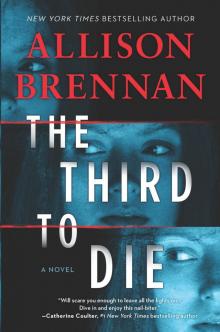 The Third to Die
The Third to Die Nothing to Hide
Nothing to Hide No Way Out
No Way Out Cold as Ice
Cold as Ice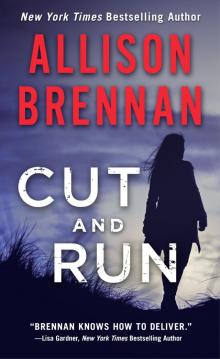 Cut and Run
Cut and Run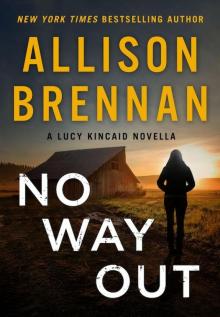 No Way Out (Lucy Kincaid Novels)
No Way Out (Lucy Kincaid Novels) Storm Warning
Storm Warning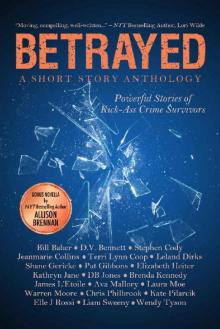 Betrayed: Powerful Stories of Kick-Ass Crime Survivors
Betrayed: Powerful Stories of Kick-Ass Crime Survivors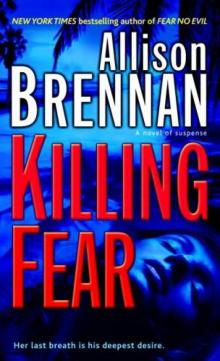 Killing Fear pb-1
Killing Fear pb-1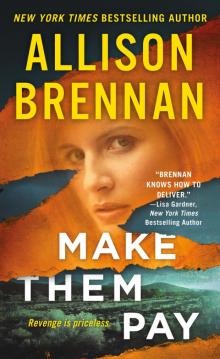 Make Them Pay
Make Them Pay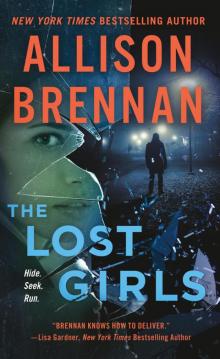 The Lost Girls
The Lost Girls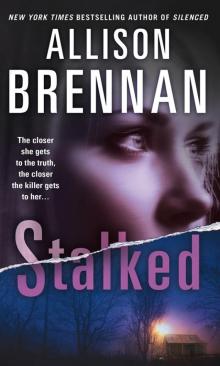 Stalked
Stalked Killing Justice
Killing Justice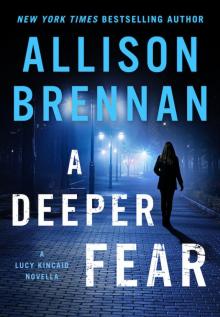 A Deeper Fear
A Deeper Fear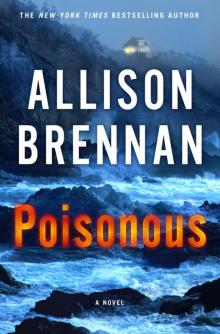 Poisonous
Poisonous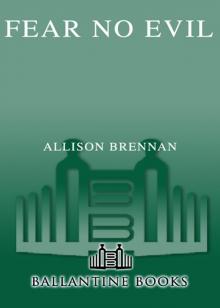 Fear No Evil
Fear No Evil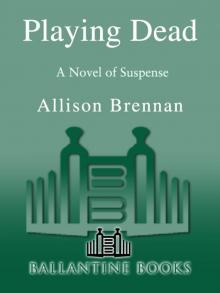 Playing Dead
Playing Dead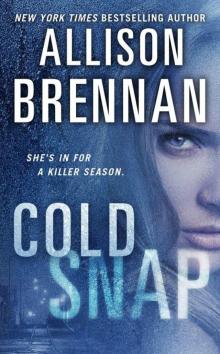 Cold Snap
Cold Snap Vacation Interrupted
Vacation Interrupted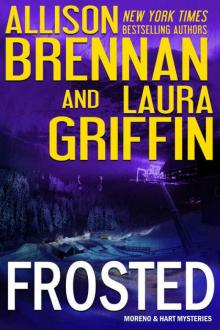 Frosted (Moreno & Hart Mysteries)
Frosted (Moreno & Hart Mysteries)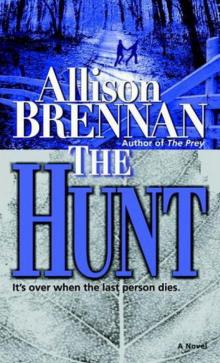 2 - The Hunt
2 - The Hunt Stolen
Stolen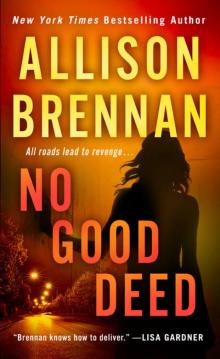 No Good Deed
No Good Deed Cutting Edge
Cutting Edge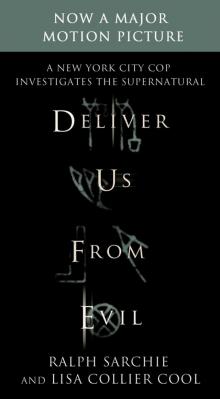 Deliver Us from Evil
Deliver Us from Evil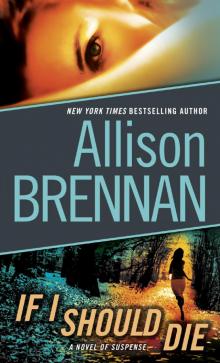 If I Should Die
If I Should Die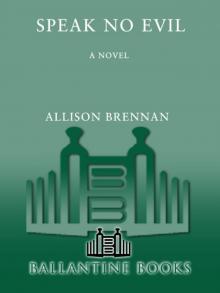 Speak No Evil
Speak No Evil Silenced lk-4
Silenced lk-4 Original Sin sds-1
Original Sin sds-1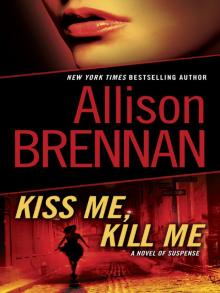 Kiss Me, Kill Me lk-2
Kiss Me, Kill Me lk-2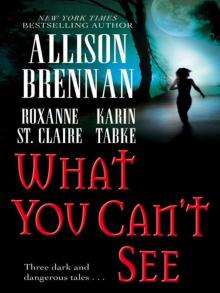 What You Can’t See
What You Can’t See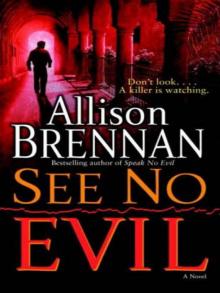 See No Evil
See No Evil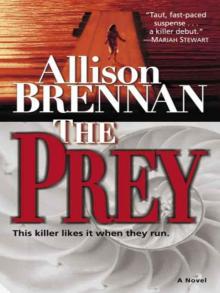 The Prey
The Prey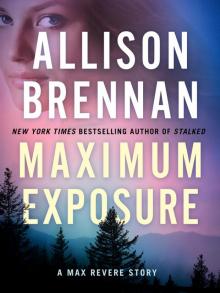 Maximum Exposure
Maximum Exposure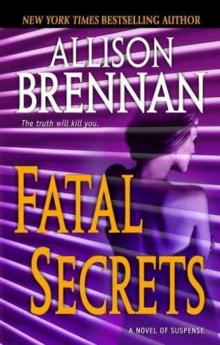 Fatal Secrets f-2
Fatal Secrets f-2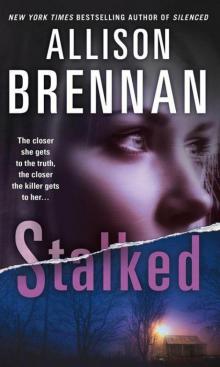 Stalked lk-5
Stalked lk-5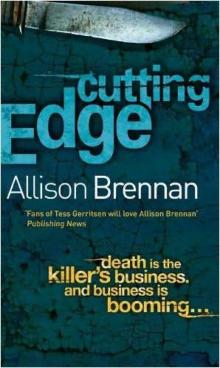 Cutting Edge f-3
Cutting Edge f-3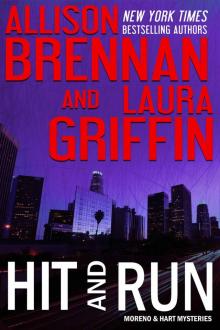 Hit and Run (Moreno & Hart Mysteries)
Hit and Run (Moreno & Hart Mysteries)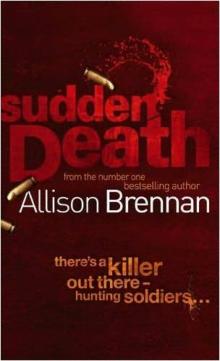 Sudden Death f-1
Sudden Death f-1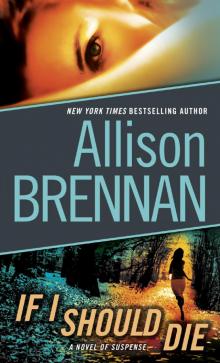 If I Should Die lk-3
If I Should Die lk-3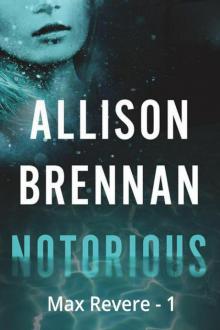 Notorious
Notorious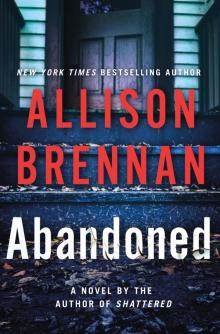 Abandoned
Abandoned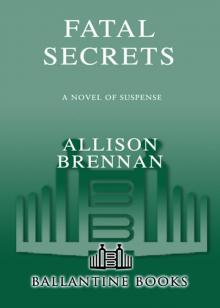 Fatal Secrets
Fatal Secrets The Hunt
The Hunt Carnal Sin sds-2
Carnal Sin sds-2 Love Is Murder
Love Is Murder Lost and Found
Lost and Found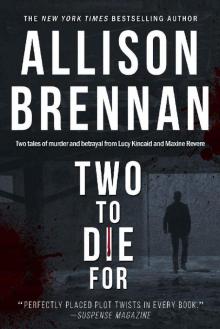 TWO TO DIE FOR
TWO TO DIE FOR Breaking Point
Breaking Point Best Laid Plans
Best Laid Plans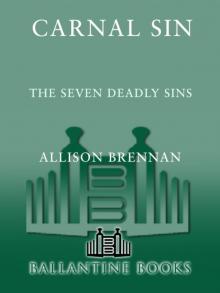 Carnal Sin
Carnal Sin Silenced
Silenced Dead Heat
Dead Heat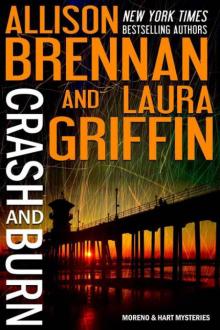 Crash and Burn
Crash and Burn Sudden Death
Sudden Death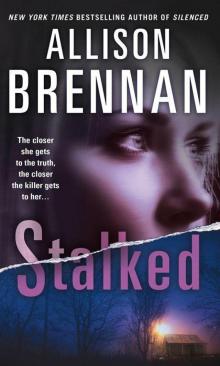 Lucy - 05 - Stalked
Lucy - 05 - Stalked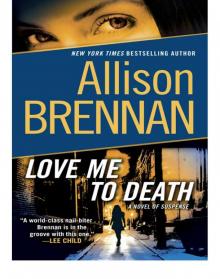 Mortal Sin
Mortal Sin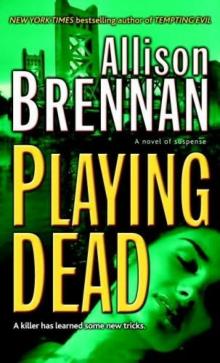 Playing Dead pb-3
Playing Dead pb-3 Kiss Me, Kill Me
Kiss Me, Kill Me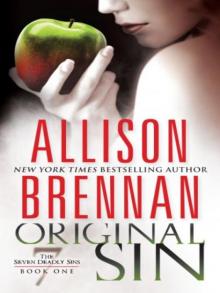 Original Sin: The Seven Deadly Sins
Original Sin: The Seven Deadly Sins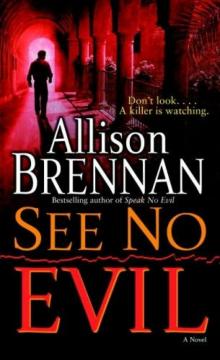 See No Evil e-2
See No Evil e-2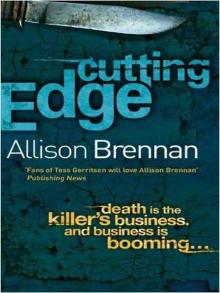 Cutting Edge: A Novel of Suspense
Cutting Edge: A Novel of Suspense Original Sin
Original Sin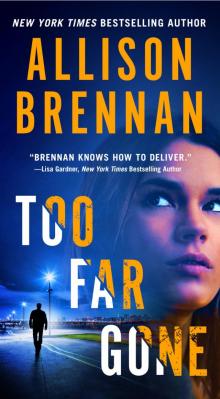 Too Far Gone
Too Far Gone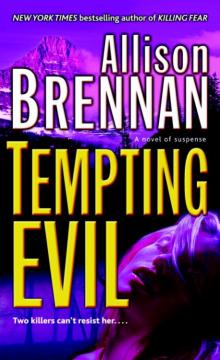 Tempting Evil
Tempting Evil Shattered
Shattered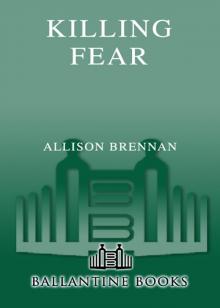 Killing Fear
Killing Fear Murder in the River City
Murder in the River City Love Is Murder (lucy kincaid)
Love Is Murder (lucy kincaid)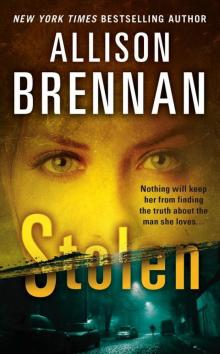 Stolen (Lucy Kincaid Novels)
Stolen (Lucy Kincaid Novels)